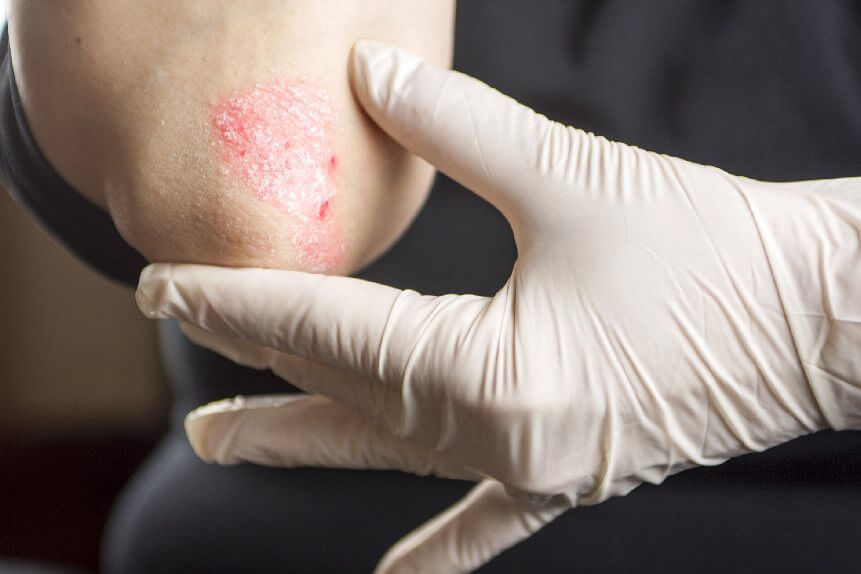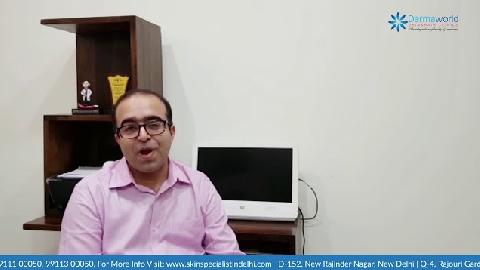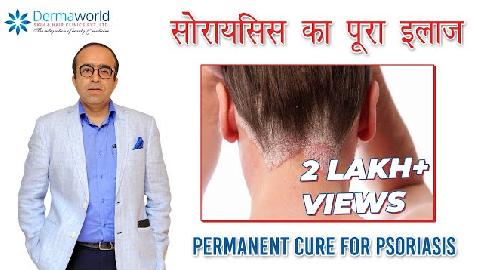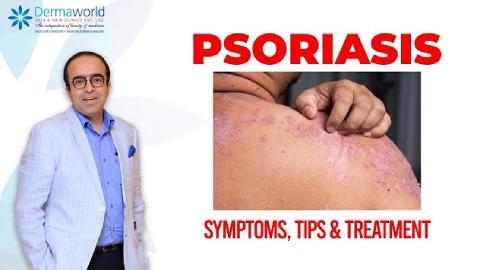
The symptoms
- Red and itchy scaling plaques.
- Scaly and white silvery patches.
- Joint swelling.
- Stiffness or pain in case of psoriatic arthritis.
Psoriasis Treatment in Delhi, India
Psoriasis is a chronic, autoimmune condition that causes a rapid build of the skin cells that results in scaling, as the body makes new skin cells in days instead of weeks. This fast build-up of cells results in the formation of scaly patches (plaques) on the skin.
Psoriasis tends to be a lifelong disease, and it is necessary to consult a certified dermatologist to control this disease and achieve a clear skin. It is essential to know what factors trigger psoriasis before deciding the course of treatment. One must opt for a healthy lifestyle, and good skincare routine as psoriasis can increase the risk of developing certain other diseases. As people suffering from psoriasis are more prone to cause obesity, cardiovascular disease, diabetes, and other inflammatory diseases.
As mentioned earlier, it is an autoimmune disorder, therefore it occurs because of some changes in the immune system. T cells (white blood cells) protect the body from disease and infections. When these T cells become overactive and set other immune responses, it leads to psoriasis.
An individual suffering from psoriasis may also have to deal with low self-esteem because of their diminished skin appearance. Psoriasis is not contagious and can be controlled with proper medication and treatment. Our skin specialists at Dermaworld Skin Clinics can help chalk out an individualised plan for Psoriasis treatment in Delhi.
The treatment for psoriasis is determined based on the severity of psoriasis, and the area of the skin affected. The doctor will first provide with mild treatments, like the application of topical creams, and further with stronger treatment.
Diagnosis
1. The doctor will conduct a physical examination of the skin, nails, scalp and will also look into the medical history (recent immunisation, family history of psoriasis, immunosuppressive conditions like HIV) of the affected individual.
2. Skin biopsy is also conducted to determine the exact type of psoriasis.
Sometimes, psoriasis can be mistaken with other conditions, so additional tests are also performed to exclude other possible causes. This helps to avoid misdiagnosis. The patient must also keep a record of their symptoms.
Book An Appointment
ALL CLINICS CLOSED ON SUNDAY
Types of Psoriasis
- 1
Plaque psoriasis: It causes red, silvery-white dry, scaly skin patches. Psoriasis mostly affects body areas such as the back, scalp, knees, and elbows. Patches can be 1 to 10 centimetres wide, and scratching can worsen this condition.
- 2
Nail psoriasis: It is characterised by crumbling, pitting, grooves, and lifting of the nail plate, as well as white or yellow-red discolouration occurs. Sometimes, it is often confused with fungal infections and other nail infections.
- 3
Guttate psoriasis: It mostly starts from childhood, and appears as small or drop-shaped red spots on the skin. They can appear on the face and scalp, and the spots are not as thick as in case of plaque psoriasis. If proper treatment is not provided, it can convert into plaque psoriasis. Strep throat, stress, bacterial infection, and certain medications can also trigger guttate psoriasis. If guttate psoriasis is caused by a bacterial infection, then antibiotics can help to manage this condition.
- 4
Inverse psoriasis: It is also called flexural psoriasis, and it mainly affects the areas of the skin such as groin area, armpits, under the breast area, and between the buttocks. Sometimes it is also misdiagnosed as fungal or bacterial infection and makes the skin to skin contact uncomfortable. It most commonly occurs in overweight people. This psoriasis is often red, moist, shiny, and smooth in appearance.
- 5
Pustular psoriasis: It is a severe form of psoriasis and develops in the form of white pus-filled pustules that surround the red skin. The pus is non-infectious and can cause flu-like symptoms such as chills, muscle weakness, fever, and rapid pulse. It mostly affects the body’s isolated areas like hands and feet or affects most of the skin’s surface.
- 6
Scalp psoriasis: It is most common with people suffering from plaque psoriasis. It is often painful, itchy, and is noticeable at the hairline. Excessive scratching can also cause other scalp problems and hair loss. It can also affect the ears, neck, and face.
Best Psoriasis Treatments
Psoriasis treatments in Delhi provided by Dermaworld Skin Clinics help to reduce inflammation and achieve clear skin. These include:
1. Topical treatment:
- Over the counter (OTC) moisturisers after showers and baths help the skin to keep moisture and prevent flaking of the skin. However, it does not help treat inflammation.
- Certain low dose corticosteroid creams and ointments also control excessive production of skin cells and soothe the skin.
- Coal tar creams and ointments help to reduce inflammation and scaling. But coal tar is messy and can stain clothing and bedding.
- Medicated shampoos help to treat scalp psoriasis.
2. Light therapy
Also known as phototherapy, this method involves exposing the affected area to a controlled amount of natural light or artificial ultraviolet light.
Providing natural light to the skin with a limited amount of sunlight helps to improve psoriasis by slowing down the skin cell turnover. It also reduces inflammation and scaling. Intense exposure to sunlight can also cause the worsening of symptoms and can cause skin damage.
Ultraviolet B (UVB) phototherapy method helps to slow down the production of skin cells. It can be used to treat single or widespread psoriasis patches which do not respond well to topical treatments.
3. Excimer Laser
This laser helps to treat mild to moderate psoriasis. These lasers provide a concentrated beam of UVB light which only targets the patches of psoriasis, and not the surrounding skin. It is useful in treating small patches.
4. Pulsed dye laser
It destroys the tiny blood vessels that surround the psoriasis plaques and reduce cell growth by cutting off the blood flow in that area.
Psoriasis management on a personal level
Along with the treatments, our skin specialists suggest some self-care tips to reduce dryness and control flare-ups and worsening of psoriasis. Such as:
- One must apply a good moisturising cream as it can help to reduce dryness and itching. It must be immediately applied after taking a bath to lock moisture in the skin.
- Quit smoking and avoid products that can irritate the skin.
- Wear skin-friendly and loose clothing that does not rub psoriasis affected area.
- Eat a healthy diet, and try to reduce stress.
Frequently Asked Questions
Psoriasis is a skin condition that is caused by the overactive immune system of the body. This skin disorder causes skin cells to multiply at a faster rate, which makes the skin build-up and form bumpy red, silvery, or white patches on the skin. If not provided with proper medical care, the condition can be more painful, and itchy plaques can even cause scarring of the skin. Though psoriasis cannot be treated entirely but with the right treatment, this condition can be effectively managed. Some of the best psoriasis treatments include:
Topical therapies: It includes moisturizers for keeping the skin hydrated to avoid flaking of the skin. Certain creams and ointments are advised by the doctor for controlling the excessive production of skin cells and coal tar creams to minimize the inflammation and scaling of the skin.
Light therapy: This treatment is also known as phototherapy that involves exposing the affected area to natural ultraviolet light to minimize the production of more skin cells.
Excimer laser: This is a new and advanced way of treating mild to moderate psoriasis in which laser light is used to target psoriasis patches.
Pulsed dye laser: This technique is performed to destroy the tiny blood vessels to minimize the growth of cells in the skin.
Dr. Rohit Batra is one of the best doctors for psoriasis who is an adult, pediatric, and cosmetic dermatologist & dermato-surgeon based in New Delhi. He has more than a decade of experience of working as a Skin Specialist, Aesthetic Dermatologist, Trichologist, Hair Transplant Surgeon, and Dermatosurgeon in Delhi and has been awarded with the honour of “Leading Health Professional of the World, 2011” by International Biographical Centre, Cambridge, England. He has provided the best results to many patients dealing with psoriasis with the help of customized treatments. So, one can consult him for treating psoriasis.
There is no complete cure of psoriasis that provide fast results, and one should consult with a dermatologist if they suffer from such disease at an initial phase, to prevent the worsening of the problem. Some skin and health tips that can help in easing out of symptoms:
- Use moisturizer to avoid dryness of skin.
- Quit smoking as it increases psoriasis among individuals.
- Eat healthy foods that soothe the skin such as olive oil.
- Minimize the stress levels as psoriasis is triggered by stress.
- Stop consuming alcohol, refined sugars, carbohydrates, red meat, and saturated fats as these products trigger flare-ups.
- Get some natural sun rays as ultraviolet radiation can slow the growth of cells in the skin triggered by the psoriasis.
- Wear skin-friendly clothes.
If psoriasis left untreated, then it can cause the formation and spread of plaques, which can be quite painful and itchy. Besides this, an individual suffering from psoriasis may also suffer from:
- Low self-esteem.
- Reduced quality of life.
- Hair loss due to scalp psoriasis.
- Painful changes in nails.
- Increased frequency of flares of psoriasis.
- Feel depressed and anxious about their skin conditions.
Psoriasis can be mild, moderate, or severe, depending upon how it affects the quality of a person's life. It is challenging to deal with psoriasis, and an individual suffering from this condition is at higher risk of suffering from concerns like high blood pressure, depression, high cholesterol, and depression. Thus one should always consult with their dermatologist to avoid the severity of this skin condition.




